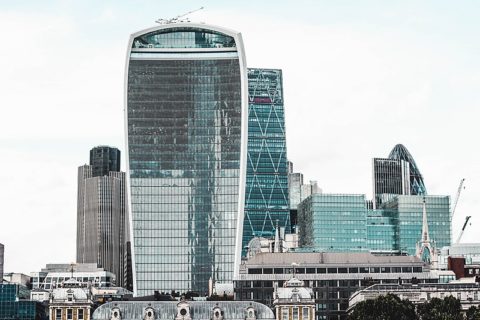Ed West on the increasingly rare creature known as the city or urban conservative (he’s primarily talking about the UK, but it applies equally well in Canada and the United States):

20 Fenchurch Street in London has been nicknamed the “Walkie-Talkie” due to its distinctive design.
Image by Toa Heftiba via Wikimedia Commons.
It’s largely forgotten now, but political polarisation is written into the very fabric of London. In the 18th century, when rivalries between Whigs and Tories were at their most intense, different West End squares were built so that the two groups could live among their own kind.
Hanover Square in Mayfair was built for Whigs to live cosily while, further south, St James’s Square was a home for Tories. This was close to the Cocoa Tree coffee house in Pall Mall, their unofficial meeting place, where in the 20th century workmen found a bolt hole so that they could make a quick escape if the authorities turned up.
At the time the Whigs were the party of London merchants, and the Tories that of the country, where they enjoyed widespread support from the rural population. They had once been seen as dangerously close to the old Jacobite dynasty, hence their fear of being arrested, but as that issue receded their popularity in the country at large become stronger. The Whigs were an out-of-touch metropolitan elite, sipping on their fancy “coffee”, but this didn’t stop them ruling the country for decades, nor shaping its political and historical narrative.
Two or three political realignments later, we have arrived to where we started again. As of today the City of Westminster, home of those fashionable West End squares as well as the seat of government itself, is no longer controlled by the Conservatives, as seismic an event in the great realignment as the loss of Kensington was in the 2017 election.
In fact the whole of London is emptying of Conservatives, the party losing Wandsworth and holding onto just three boroughs. It’s not just London: the Tories have no councillors in most large cities now.
As with many social patterns, in this we are following the United States, where Bill Bishop coined the phrase “The Big Sort” to describe how Americans were becoming more polarised by geography, and which Will Wilkinson described as the formation of “communities of psychologically/ideologically similar people”.
This has resulted in cities becoming one-party enclaves, as progressive values become the norm, and conservative-minded people leave. My own parliamentary constituency, in north London, was from its formation in 1983 a suburban Tory seat but shifted between three different parties during the 80s and 90s; at the last election Labour had a 20,000 majority. Labour has now run my borough, Haringey, for 51 years, and the last time the Tories won it, back in 1968, they also took Hackney, Lambeth, Lewisham and in total 28 of London’s 32 boroughs. Truly a different world. Today they do not even fully-field candidates in some wards.



